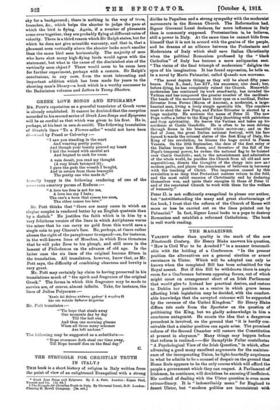• Greek Lova Songs and Epigrams. By J. A. Pott.
London: Kogan Paul, Trench and Co. [la 65.1 t The Struggle for Christian Truth in Italy. By Giovanni Luzzi, D.D. London: Fleming H. Revell Company. [5a. net.]
dislike to Papalism and a strong sympathy with the modernist movements in the Roman Church. The Reformation bad. Signor Giovanni Luzzi declares, far more influence in Italy than is commonly supposed. Protestantism is, he believes, still a power in Italy. At the same time be cannot bide from himself that it is not in accord with the genius of the people. and he dreams of an alliance between the Protestants and Modernists of Italy which shall save Italian Christianity when the political Romanism professed by the " black Catholics" of Italy has become a mere antiquarian sect. " The vision of the final triumph of modernism " delights the eyes of his imagination. It has found expression, he tells ea. in a novel by Mario Palmarini, called Q:uxndo non morremo.
"The novel depicts things as they will be about fifty years hence. Pius X., dead; Leo XIV., his successor, also dead; but, before dying, he has completely ruined the Church. Meanwhile modernism has continued its work steadfastly, has invaded the Vatican and has conquered the greater number of the cardinals The heads of the movement have their eyes on a cardinal, Father Silvester from Fermo (Marna of Ancona), a modernist, a large- hearted man, living a truly simple apostolic life. The conclave meet to elect the new Pope, and Father Silvester is elected by a large majority. He assumes the name of Peter IL The new Pope writes a letter to the King of Italy throbbing with patriotism and deep spirituality. He leaves the Vatican and takes up his residence at Castle Gandolfo. He is often to be seen driving through Rome in his beautiful white motor-car; and on the 2nd of June, the great Italian national festival, with his face turned towards the colossal statue of the first King of Italy, the King of the revolution, he blesses the huge crowd in Piazza Venezia. On the 20th September, the date of the first entry of the Italian troops into Rome, and therefore of the fall of the Pope's temporal power, he orders the national flag to be hoisted over Castle Gandolfo ; and, to the astonishment and admiration of the whole world, he purifies the Church from all old and new superstitions, directs the thoughts of the clergy into new an t modern paths, and places the consciences of believers in harmony with the teaching of Christ. The impression caused by this revolution is so deep that Protestant nations return to the fold, and the most rabid enemies of Christianity end by declaring themselves won, and unite their energies to those of Peter II and of the renovated Church to work with them for the welfare of humanity."
Peter IL is not sufficiently evangelical to please our author, but " notwithstanding the many and great shortcomings of the book, 1 trust that the reform of the Church of Rome will more or less be carried out on the lines pointed out by Palmarini." In fact, Signor Luzzi looks to a pope to destroy Romanism and establish a reformed Catholicism. The book is well worth reading.


































































 Previous page
Previous page